Political Ideologies - Nationalism | 11th Political Science : Chapter 7 : Political Ideologies - Part-I
Chapter: 11th Political Science : Chapter 7 : Political Ideologies - Part-I
Nationalism
Nationalism
Meaning, Emergence and Spread
Nationalism refers to an ideology that promotes loyalty, affection and
devotion to a particular nation. It creates attachments among people to a
common homeland, a common language, ideals, values and traditions. It is based
on a consciousness that exalts the nation above other categories and factors of
social life. It strongly believes that the individual’s loyalty and commitment
to the nation should override their attachments with any group interest. Ernest
Gellner, an important theorist wrote the book ‘Nations and Nationalism’. He
defined nationalism as “primarily a political principle that holds that the
political and the national unit should be congruent”.
Nationalism is a modern concept. It emerged in Europe at the beginning
of modern period. It arose first in England and later on diffused to other
countries of Western Europe like France, Germany aided by French Revolution.
The North American colonies revolted and formed their own nationalism in
opposition to Europe. The African and Asian nations witnessed the emergence of
a new kind of nationalism called post-colonial nationalism as a result of anti
colonial struggle. Many factors contributed to the emergence and diffusion of
nationalism throughout the world and the notable ones include capitalism,
French Revolution, industrialization, World Wars and colonialism.
Theories of Nationalism
There are many theories of nationalism that can be listed as
v Primordial
Theory of Nationalism
v Socio-biological
Theory of Nationalism
v Social
communication Theories
v Marxian
Theory of Nationalism
v Post-ideological
Theory of nationalism
These theories can be divided into perennial theories and modernization
theories. The first two theories can be categorized as perennial theories and
the last three are designated as modernization theories.
Primordial Theory of Nationalism
The word primordial means existing at or since the beginning of the
world. The theory of primordialism considers that the people of a particular
language, region, religion, race etc have developed A great intra-group affinity
as they inhabit together since ancient period. They develop a strong ethnic
identity and loyalty. They demonstrate the qualities of affection, sentiments
and attachments. They may not exhibit ostensibly sufficient social interactions
as part of their affinity. Nevertheless the primordial identities are powerful
having even coercive impact on their lives. The primordial theory of
nationalism is grounded on the concept of ethnic nationalism.
Socio-biological Theory of Nationalism
This theory considers nationalism as emotional attachments of a group of
people who identify with and agree on a common descent. The people consider
themselves as belonging to an extended family. For them, the nation is the
family writ large. Nationalism is a blend of both rationalism and
irrationalism. It is a ‘primitive mind with modern techniques’. As for as the
roots are concerned nationalism relies on the past. But on its relations with
other groups it is contemporary. Nationalism shows the face of ethno centrism
towards the members of the group and xenophobia to the members of the other
groups and nations.
Post-Ideological Theory of Nationalism
A number of theorists propounded the post- ideological theories of
nationalism. Anthony Giddens, Paul Brass and Michael Mann are the main authors
of this theory.
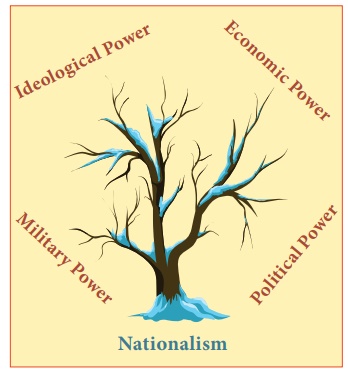
They differ greatly in their expositions about the origin and nature of
nationalism but a fundamental similarity exists as all of them identify State
as the most paramount factor in the evolution and operation of nationalism.
They argue that though nations and nationalist sentiments existed in the
medieval period, nationalism blossomed fully only in the modern period with the
emergence of the modern State. Anthony Giddens argued that the advent of French
Revolution engineered the birth and growth of nationalism all over Europe.
Michael Mann articulated that there are four sources of social power.
They are
1) Ideological power
2) Economic power
3) Military power and
4) Political power.
These four sources, often in combination acted historically to produce
nationalism in different periods. The ideological factor in the form of
religion promoted the birth of infant nations as in the case of England in the
16th century. The second phase saw the economic, especially commercial
power contributing to
the birth of nationalism in Western
Europe. The military power
influenced the origin of nationalism in the third phase and finally political
power shaped the evolution of
nationalism.
The central argument of these theorists belonging to post-ideological
theory of nationalism is that the modern State along with commercial capitalism
initially created and influenced the growth of nationalism.
Communication Theory of Nationalism
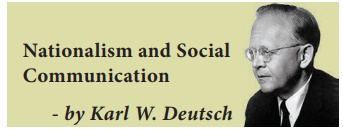
Karl Deutsch and Benedict Anderson are among the important theorists of
communication theory of nationalism. Deutsch defined nation as ‘as a group of
people who communicate more effectively and intensely with one another than
with people outside the group’. He examined the data from different streams of
knowledge like economics, history and demography and arrived at the conclusion
that communication played the role of a parent in the birth of nationalism and
nationality. The development of effective internal communication linked all
people in the country and created the feelings of moral and political identity
contributing to the emergence of nationalism.
Anderson described the nation as an imagined community and nationalism
as its life force. He wrote the book ‘Imagined Communities’ and argued that the
nation is an imagined community exiting only in the mind, imagination of the
people. The members of a nation do not see, talk and know all the other members
of the nation. Yet, they consider all other members as their own people.
When a cricket match is played, lakhs of spectators in the ground and
people before the TV sets perceive each other as members of the same community
sharing joy and sorrow at the victory and defeat of the team. Similarly the
Tomb of the Unknown Soldier is another example for the concept of imagined
community. The people do not know personally the soldier whose body is buried
in the tomb but all compatriots have emotional attachment with the tomb.
Cricket Match Spectators
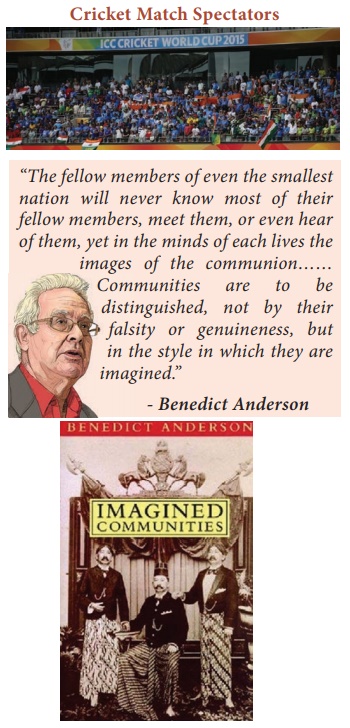
Anderson contends that the capitalism and the discovery of the printing
press played a crucial role in the emergence of nationalism. After the
discovery of the printing press, books were printed and sold in large volumes
in the vernacular languages of the period like English, French and German.
Millions of the people for the first time in history had the opportunity of
reading books in their own languages. As they read the same text and matter
they developed in their minds the same thoughts and ideas leading to the
creation of the idea of community in their minds. Capitalism helped in the
process of creation of imaginary community. The capitalists wanted to earn
profits and printed books in large quantities and sold them. The print
capitalism (the combined forces of capitalism and printing press) contributed
to the advent of nationalism in the minds of the people.
Marxist Theory of Nationalism
Marxism considers nationalism as an offspring of capitalism. Nationalism
was created by capitalism to protect the exploitative capitalist order. Karl
Marx contended that the ruling ideas are essentially the ideas of the ruling
class that owns the means of production. The capitalist class possesses private
property and indulges in the exploitation of the property-less class.
Nationalism was conceived and created by the bourgeois class for its own
benefit to numb the feelings of the workers. “Nationalist consciousness is
quintessentially a false consciousness deliberately created perpetuate and
legitimize class exploitation”. Marx commented, ‘The Proletariat has no
fatherland’. He issued a clarion call in the ‘The Communist Manifest’ to the
workers of the world to conduct revolution for ending capitalism and
establishing socialism all over the world. He favoured internationalism and
opposed nationalism.

Michael Hechter, Miroslov Hroch and Tom Narim are the important Marxist
theorists to analyze nationalism.
Indian Nationalism
Indian nationalism emerged in the second half of the 19th century. All
Indians began to think of nationalist feeling transcending their religious,
regional, linguistic, ethnic differences and barriers. There are two kinds of
factors responsible for the emergence of Indian nationalism. They are internal
and external factors.
Internally speaking, the concept of Indian unity is always ingrained in
the minds of the people. Though the Indian subcontinent for many centuries was
politically fragmented it continued to be culturally unified. The concept of
unity in diversity exists in Indian tradition since ancient period. The seeds
of modern nationalism germinated and grew luxuriantly in the fertile soil of
this centuries-old cultural unity.
Externally, the impact of British colonial rule facilitated the growth
of Indian nationalism. The major forces are;
A.
Colonialism carried out the political, administrative, economic
and communication unification of India. India was a politically divided
subcontinent in eighteenth century with over 700 different territories and
rulers. The British unified them into one country. India followed village-based
economy. Colonialism introduced modern economy and market system unifying the
country economically. The British rule introduced modern means of communication
like railways, telegraphs, uniform postal system-making transport and movement
of people, goods and ideas easier and faster throughout the subcontinent. The
newly unified India in the 19th century was conducive for the emergence of the
modern political force called nationalism.
B. Western education was introduced in India by colonialism. Indians
learned modern political ideas like liberty, equality, sovereignty in the
classrooms and demanded that our motherland should be empowered with those
modern political values.
C. English became the lingua franca of India during colonialism. India
is a polyglot nation as it speaks more than a thousand languages and political
unity was derailed. In this backdrop the English language became the language
of communication among nationalists facilitating the growth of nationalism.
D. The 19th century witnessed the emergence of many socio-religious
reform movements like Brahmo Samaj of Raja Ram Mohan Roy, Prarthana Samaj, etc.
They strove to sow the seeds of renaissance and reform in Indian society. They
also revived the memories of centuries-old great Indian civilization even while
articulating the need for reforming Indian society and eliminating evils like
sati, caste system and untouchability.
E. Racialism of British rulers and authorities created bitterness among
Indian people. Indian nationalism grew as a protest movement against the racial
humiliation of Indian people in the colonial period. They reacted against the
concept of the White Man’s Burden flaunted by the colonial rulers. It refers to
idea that the white people are the most advanced and civilized race in the
world and their mission in India is to civilize the Indian people. Indian
leaders repudiated this racial myth and mobilized Indian people through the
medium of nationalism.
F. The patently exploitative and flagrantly arrogant rule of the
Governor General Lord Lytten spurred the faster emergence of Indian
nationalism. He imposed discrimination on Indian vernacular press. Measures
were taken to promote the import of goods from England and to restrict the export
of Indian goods to England. No active relief was provided by the colonial
government when millions of people suffered and even died under severe drought.
There was an unnecessary war with Afghanistan in which thousands of Indian
soldiers died. Indian nationalism grew as a result of anger against the
maladministration of Lord Lytten.
G. Lord Ripon was a notable Governor General of India. Along with the
Law Member Ilbert, the Governor General introduced a Bill granting powers to
Indian judges to sit in the trial of cases involving Europeans. There was a
huge protest organized by racist people and the government was forced to
backtrack on its proposal. Indians were disappointed at the behaviour of
Europeans in India. The Ilbert Bill controversy taught Indians the art and
science of political agitation against the negative actions of the government.
These factors created the conditions for the conclusive emergence of
Indian nationalism in the 19th century that powered the Indian struggle for
independence.
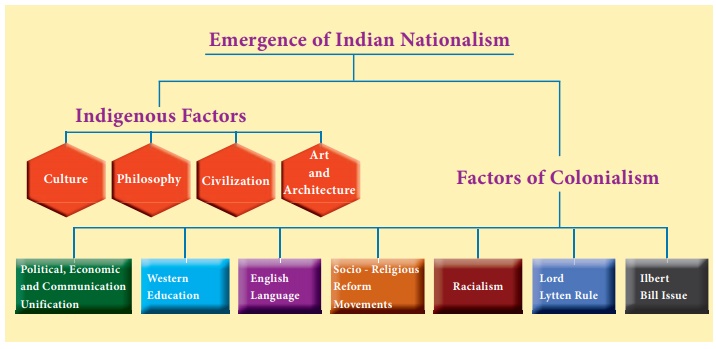
Challenges before Nationalism
Nationalism faces a host of challenges in the contemporary period. Some
of them are intra-national and many of them are extra-national in origin and
theatre of operation. The paramount challenges can be listed as secessionism
and globalization.
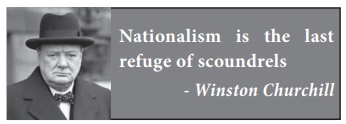
Secessionism
Nationalism grapples with a strong adversarial force, called by many
names like separatism, sub-nationalism, splitism and secessionism. The Quebec
separatism in Canada, Balochistan movement in Pakistan, Uighur issue in China,
Catalan nationalism in Spain are the living examples of nationalism being
questioned and endangered by intra- national forces.
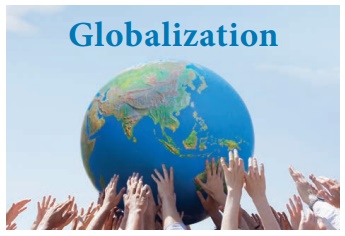
Extra National Factors
Many extra-national and global factors imperil nationalism.
Globalization refers to the increasing integration of the world in terms of
economy, trade, technology, culture and institutions. The contemporary world is
dominated by the ascendency of globalization process. The barriers between and
among nations are being undermined by the onward march of globalization.
Economically, multi-national corporations have established their production and
sale units across many countries and continents. They employ people belonging
to different countries and exercise great influence in political domain also.
The establishment and functioning of World Trade Organization has
hastened the process of globalization. ’Barrier-free trade’ is the fundamental
slogan of the organization. It has created several agreements in the last two
decades from 1995 the year of its inception and till now and has brought down
the trade and tariff bottlenecks in international domain that partly
contributed to the two world wars in the 20th century. Trade tariffs are
closely related to nationalism and their elimination erodes the rationale of
nationalism.
There is a large-scale migration of the skilled people propelled by the forces of globalization. The highly educated and technologically qualified people migrate from Asian and African countries to the developed countries like the United States, Australia and countries of Western Europe. The educated and technologically advanced Indian and Chinese youth have migrated in large numbers to the United States in the age of globalization.
The international regional organizations have eroded the stature of the States and their nationalism by promoting regional economic co-operation. The European Union consisting of 27 nations is the most advanced international regional organization that seeks to achieve economic, political and cultural integration. It has created European Parliament, European Council and European Commission. Euro is its currency and a large portion of the dream to create structures for the free movement of people, capital, service and goods has been realized. It has brought out the concept of ‘Pooled Sovereignty’ where the States share their decision-making powers with member-States of the regional organization foregoing their sovereignty, definitely a blow to the concept of nationalism and its cardinal feature of State sovereignty. Succinctly to state, the continent of Europe from being the cradle of nationalism has become the beacon of globalism.
The gradual emergence of the role and relevance of the United Nations
indicates the march, though slow of the humanity towards a World Government
that is a negation of nationalism and its political body the state.
Radical ideologies adhering to a different kind of internationalism pose
a threat to the concept of nationalism. For example the Islamic State with its
ideology of salafism (Pure Islam) rejected the concept of nationalism and
nation States as anti-Islam. It established a caliphate in the captured
territories in Syria and Iraq in 2014 and appealed to the global Islamic
community to be associated with the international jihad to establish a global
Islamic State or universal Caliphate.
The environmental problems like climate change, acid rain, ozone
depletion have been caused by factors within the nation but the consequences
and remedies are transnational and beyond the capacity of nationalism and
national States to solve. The environmental conservation responsibility is a
global challenge and numerous multi-lateral environmental conferences have been
conducted by global community to discuss and provide solutions.
The growth of information technology especially internet, mobile phones
and social media have left a profound impact on the concept of nationalism. It
has sided with internationalism. The national State cannot effectively protect
its nationalism and national interests as cross border transmission of ideas
and networks become stronger.
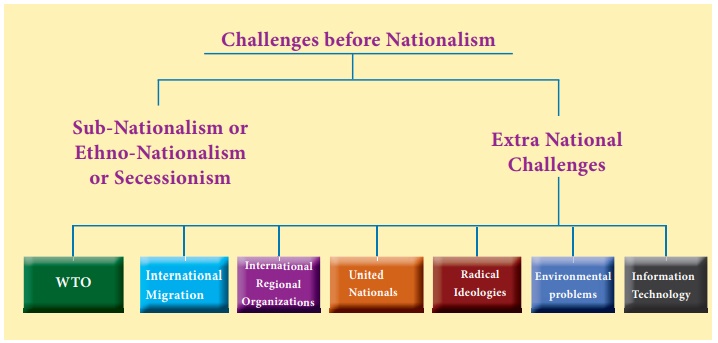
The communication revolution has shrunk the world and the idea of the
global village gains momentum that in the long run may jeopardize nationalism.
Nevertheless, it cannot be denied that nationalism continues to be a
strong ideology in the 21st century too. The end of nationalism is not
observable even in the distant horizon. The State still retains with itself the
priceless feature of sovereignty. The ultimate deciding factor of
internationalism is still nationalism and national interests. The BREXIT or
exit of Britain from the European Union and the exit of United States from 2015
Paris Accord of the United Nations Framework Convention on Climate Change on
grounds of national interests reveal the relevance and resilience of the
ideology of nationalism.
Related Topics